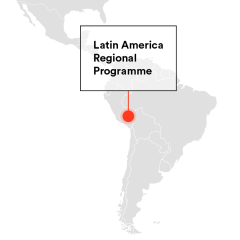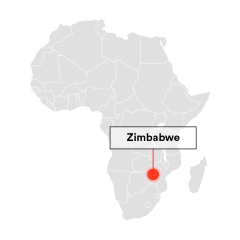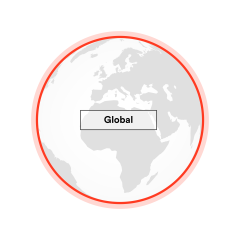Engage the private sector to end VAWG

Engage the private sector to end VAWG
Case Studies

The Spotlight’s Initiative Latin American Regional Programme developed an innovative survey tool called the Diagnostic Tool on Violence against Women. The goal of the tool is to lay bare the sexist behaviour in the leadership and culture of an organisation, and to identify organisational practices that can be designed and integrated to prevent and address VAWG. The survey is answered online through the Indic@Igualdad (Equality@Work) platform. There are multiple sections of the survey that ask staff to report on various areas related to VAWG.
From the results, an Organisational Violence Index is created with a score ranging from 0 to 100. The closer the score is to 100, the greater knowledge of organisational mechanisms and their perceived effectiveness to prevent, manage and refer cases of VAWG. The diagnosis tool was implemented in 10 companies during the pilot phase, where 181 employee surveys were completed and 61 trainings on topics related to organisational violence, gender equality and masculinities benefited 766 employees.
The Spotlight Initiative programme in Belize then engaged 15 private sector companies in a campaign to raise awareness of VAWG and access to services that were available to women experiencing violence. This included displaying posters with messages on ending domestic violence, child marriage and human trafficking around the premises of companies. These campaign messages were seen by men and women employees with the aim to bring visibility to the issue and challenge gender roles and social norms that promote family violence.



In Zimbabwe and Malawi, Spotlight Initiative programmes supported the development of sexual harassment policies at multiple levels.
In Zimbabwe, in collaboration with the Zimbabwe Gender Commission, the programme filled a critical gap by supporting companies to develop gender-based violence and sexual harassment policies through the creation of the Strategy for the Elimination of Sexual Harassment and Gender-based Violence in the Workplace in Zimbabwe 2021-2025. This was developed through a consultative process with feedback from diverse stakeholders including the government, trade unions, private sector, civil society, and employer organisations. The 16 Days of Activism Against Gender-Based Violence in 2021 was then used to raise visibility of the launch of the national strategy and to highlight the development of a national anti-sexual harassment law.
The Zimbabwe programme noted that it was critical to better understand the positions and concerns of different local groups and staff working in corporations. For example, factors such as understanding how much they knew about VAWG in the workplace, the extent to which management supported a gender equality agenda, and the level of respect for women in the workplace culture were important for understanding how to best start engaging. It was important to be aware of deeply entrenched social norms related to women's 'honour' and how many employees felt VAWG was a taboo issue and a private matter. Once companies felt secure and trust had been gained, the demand for partnerships to work together increased. When the Spotlight Initiative programme trained workers in Zimbabwe to increase their awareness of harassment policies and ending gender-based violence, employees across the supply chain were trained at functional levels, keeping more homogenous groupings within the same job hierarchies (such as managers and tea workers, from the previous example), because they found the presence of senior management affected the interactions and uptake within groups.
In Malawi, legal cases were highlighted to stimulate greater attention to the issue of sexual harassment within the workplace with both employees and corporate leaders. The Malawi Commission, with support from the Spotlight Initiative programme, leveraged a 2017 legal case of alleged sexual harassment of employees at the Malawi Broadcasting Corporation, which offered a significant visibility moment around the occurrence of sexual harassment in the workplace. Due to the increased visibility that this case brought to the issue, the Commission saw increases in sexual harassment complaints being lodged as well as an increase in requests from the private and public sectors to review sexual harassment workplace policies. A new sexual harassment policy for the public sector was also supported.



In Mexico, domestic violence related calls to 911 sharply increased by 46% in the first few months of 2020 due to the impacts of the COVID-19 pandemic. There was significant demand for shelters and not enough rooms available. To respond to this, the Spotlight Initiative programme, the national government, local governments and a hotel corporation built a multi-stakeholder partnership to provide free accommodation in hotels for women experiencing violence as an interim strategy. This was a complex partnership due to the diversity of actors from the public and private sector. To address this, a protocol was developed on how the collaboration would take place and defining roles, responsibilities, and ways of working between the different actors. Technical guidelines were developed and capacity building of hotel staff and other partners to support equitable care was conducted. Additionally, a key ally was identified - the Commission for the Prevention of Violence against Women, who created connections with 10 women’s justice centres across the country to inform them of this strategy. This increased access for survivors of VAWG to critical support and justice services. Over 600 survivors of violence have been able to access these services and significant awareness-raising and training took place with more than 16,400 people to prevent gender-based violence. The collaboration and commitment of the private sector to support free accommodation and financial assistance has been critical to the success of this initiative.
In Trinidad and Tobago, Spotlight Initiative partnered with the National Trade Union Centre of Trinidad and Tobago (NTUC) and the Employers Consultative Association (ECA) to lead gender-based violence awareness workshops for their members. The Unions developed individual workplace policies and validated them. The two groups were brought together through workshops so the unions could share their individual workplace policies with employers, and areas of agreement and difference were discussed. Through this dialogue, a Joint GBV Workplace Policy was drafted by both parties and will become legally binding in trade unions to support survivors of violence. The policy covers a range of elements essential to eliminating gender-based violence in the workplace, including organisational commitment to confidentiality and support for survivors through options to safety planning, protection orders, leave, training and education, sanctions and disciplinary measures of workplace harassment or bullying, and monitoring, reporting, budgets and finance.



In Guyana, private sector companies are being encouraged and supported by Spotlight Initiative to use the Women’s Empowerment Principles. The first steps in the process included mapping private sector companies, NGOs, and governments that could benefit from the WEPs. Next, a series of webinars were held to increase awareness of the WEPs, which resulted in 18 organisations expressing interest in joining the programme and developing gender action plans and gender gap analysis tools. Currently, there are 1,600 signatories in the Latin American and Caribbean region. It was learned that additional data was needed to persuade leaders of the importance of signing the WEPs and why it was essential to create safer spaces and support gender equality, including evidence on the economic costs of VAWG.
In Uganda, 13 companies committed to implementing UNDP’s Gender Equality Seal and engaged in the first phases of the process, including internal assessments of the gender responsiveness of their organisational processes. Based on this, they developed action plans to address gaps.
In the Latin America Regional Programme, a strategic alliance was formed, Strengthening Program Violence against Women in Private companies (GES-VCM). This engages the private sector, government and civil society in addressing and preventing the impact of COVID-19 on VAWG, and aims to strengthen national public policy response to provide support to networks and access to services for women in the labour market that may face violence at home. Five companies engaged in the programme in 2020 as part of the GES implementation. The company Cementos Argos was so committed to this work that they implemented the model in four of its subsidiaries (in Colombia, the Dominican Republic, Panama, and Guatemala).







